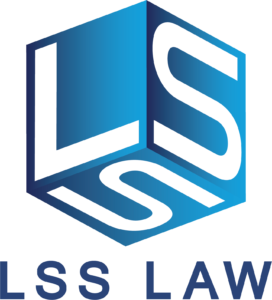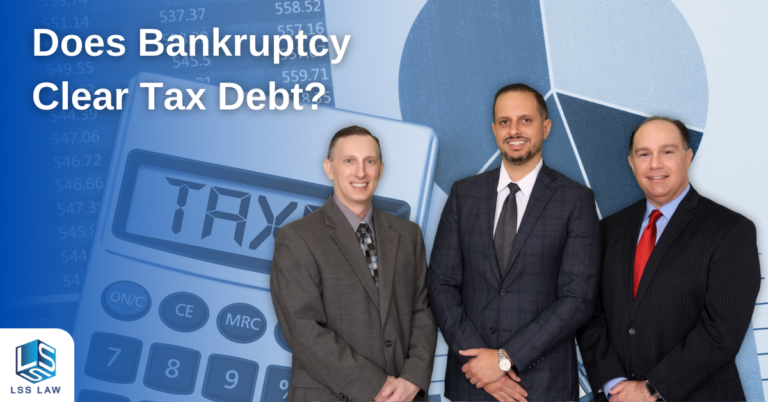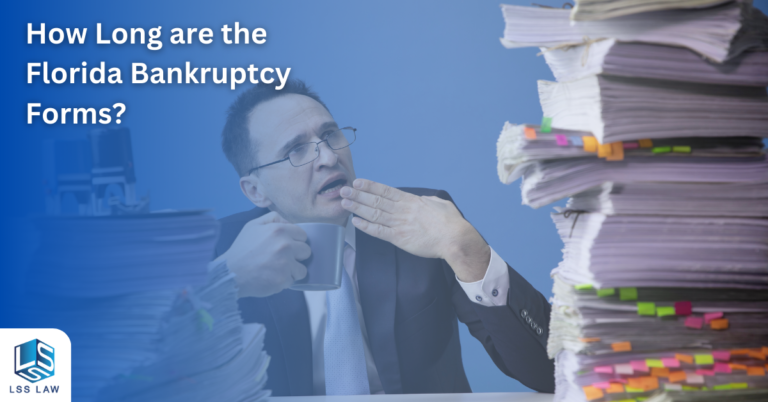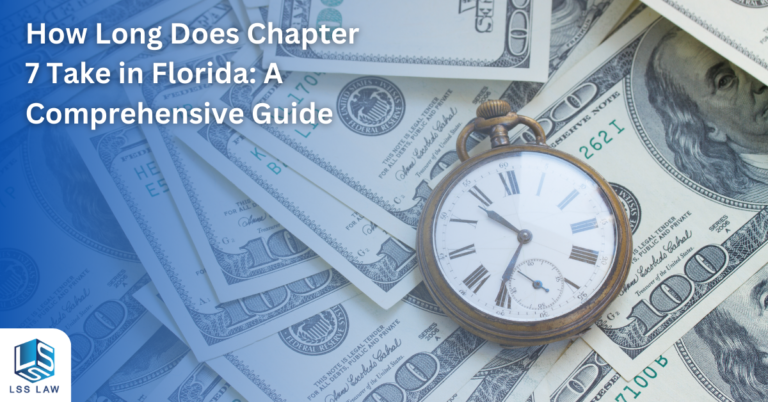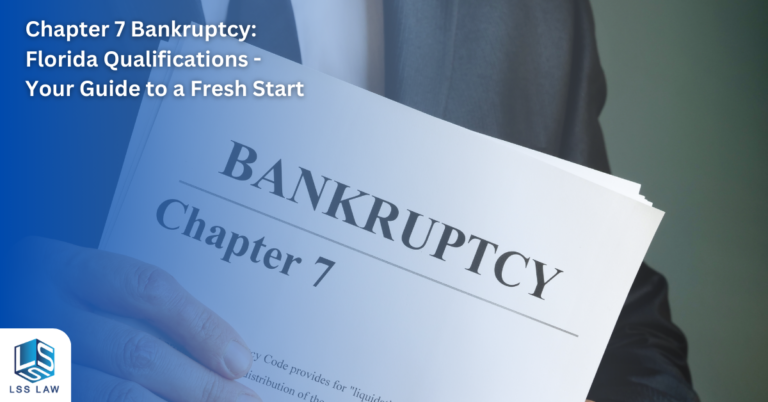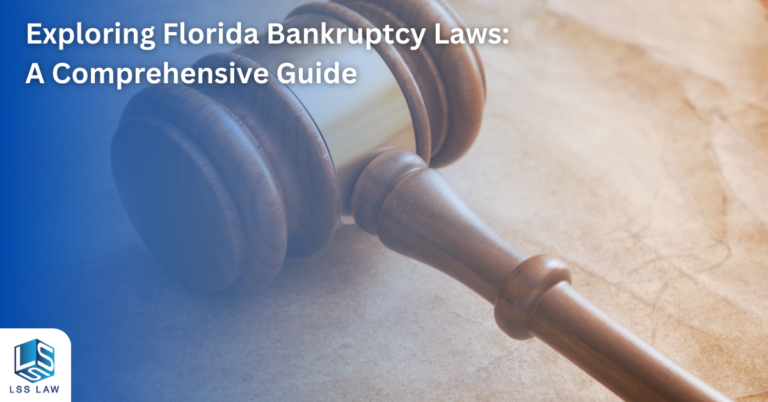Are you struggling to keep up with your tax obligations or finding it difficult to pay creditors? While the decision to file bankruptcy may be an option to help you get back on track financially, you may be wondering if it can clear your tax debt.
The answer is: it depends. Filing bankruptcy can help clear some tax debts, but not all.
Which Tax Debts Can be Cleared in Bankruptcy?
In order for your tax debt to be cleared through bankruptcy, it must meet the following criteria:
Only Income Tax Debt Can be Discharged
Only income taxes can be cleared through bankruptcy. Other types of taxes, such as payroll taxes or sales taxes, cannot be cleared through bankruptcy.
Additionally, it is important to note that only federal income tax debt and certain types of state income tax debt may be discharged in a bankruptcy case. Each state has its own laws regarding which types of state income taxes can be discharged.
The Taxes Must be Over Three Years Old
To be eligible for discharge, the taxes must have been due for more than three years prior to the bankruptcy filing.
The Taxes Must Have Been Assessed More Than 240 Days Ago
In addition to being over three years old, the taxes must have been assessed by the IRS more than 240 days before the bankruptcy filing, or they must not have been assessed yet. This is known as the “240-day rule.”
The Tax Returns Must Have Been Filed
To be eligible for discharge, each tax return must have been filed at least two years before the bankruptcy filing. If you haven’t filed taxes, then you don’t know how much you owe or whether you are due a refund that should be used to pay a creditor.
Additionally, any fraudulent tax return filed in the two years prior to the bankruptcy will not be eligible for discharge. Therefore, it is important to make sure all tax returns are filed accurately and honestly prior to applying for bankruptcy.
How Bankruptcy Can Help with Tax Debt
When filing for bankruptcy, tax debt can be cleared through Chapter 7 or Chapter 13 bankruptcy by meeting the criteria above.
Chapter 7 Bankruptcy
In a Chapter 7 bankruptcy, your non-exempt assets are liquidated to pay off your debts, including tax debts.
Chapter 13 Bankruptcy
Bankruptcy can provide significant relief for those struggling with overwhelming tax debt, and is often an effective way of eliminating tax debt altogether.
In a Chapter 13 bankruptcy, you enter into a repayment plan to pay off your debts over a period of three to five years. The monthly payments will include all eligible unpaid taxes as part of the overall repayment amount. Any tax debts that are more than three years old at the time of filing will be discharged in a successful Chapter 13 filing.
avoid unnecessary mistakes
Filing for bankruptcy can be a complicated process, and if you are considering using it to help with your tax debt, it is important to consult with a qualified attorney who can guide you through the bankruptcy process, helping you understand how it could impact your tax debt.
The right legal guidance can help ensure that any tax debt meets all the necessary criteria for discharge under bankruptcy law so that you can receive the maximum financial benefit from the bankruptcy.
Undergoing this without an experienced lawyer can be risky and potentially cost more in the long run. Filing the wrong type of bankruptcy, missing important deadlines, failing to disclose all required information, and defending yourself in bankruptcy court against creditor challenges are all potential risks.
Speaking with an experienced attorney is essential for understanding exactly how a bankruptcy filing will affect your overall tax debt situation and what steps you need to take for maximum financial benefit.
With the right legal guidance and bankruptcy can provide relief from tax debt and help you With a carefully-crafted plan, filing for bankruptcy could provide you with much-needed relief from your tax debt and a fresh start financially.
Tax Refunds and Bankruptcy
If you are entitled to a tax refund for a year in which you owe income taxes, that refund is considered part of your bankruptcy estate. However, the laws regarding income tax refund exemptions in bankruptcy vary from state to state.
In Florida, tax refunds are commonly exempted from the bankruptcy estate using Fla. Stat. Ann. § 222.25 (3), which covers earned income tax credits. This statute prevents the trustee from taking your tax refund and distributing it to creditors under this law.
While this is certainly good news, the exemptions are not always guaranteed. If you owe back taxes, the IRS will want to use your refund to pay off those debts.
It’s important to speak with a bankruptcy attorney in South Florida to fully understand how tax refunds may be impacted by a bankruptcy filing. They can provide guidance on exemptions, timing, and any other factors that may impact your specific situation, based on the current Florida laws.
Understanding a Federal Tax Lien
If you owe federal tax debt, you may be subject to a federal tax lien. A federal tax lien is a legal claim against your property, including real estate, personal property, and financial assets, that serves as collateral for your tax debt. The Internal Revenue Service (IRS) can place a lien on any of your property if you fail to pay income taxes or other types of taxes such as payroll taxes or property taxes.
If you evade paying your taxes or fail to pay your taxes in full and on time, the IRS can place a federal tax lien on any of your financial accounts or assets.
This includes both physical items like real estate and intangible possessions such as bank accounts. The IRS will continue to hold the lien until back taxes are paid in full to the taxing authority.
How Does a Federal Tax Lien Work?
A federal tax lien is automatically created when you fail to pay your federal tax debt on time. The lien gives the IRS the legal right to seize your property if you do not pay your tax debt, including taking funds from your bank account.
In addition, the lien may be reported to credit bureaus, which can negatively impact your credit score and make it difficult to obtain loans or credit in the future.
How to Avoid a Federal Tax Lien
The best way to avoid a federal tax lien is to pay your tax debt on time. If you are unable to pay your tax debt in full, you may be able to set up a payment plan with the IRS to make smaller, manageable payments over time.
In addition, it’s important to keep all of your tax returns and financial records up to date and accurate to avoid any issues with the IRS.
Deciding if Bankruptcy is Right for You
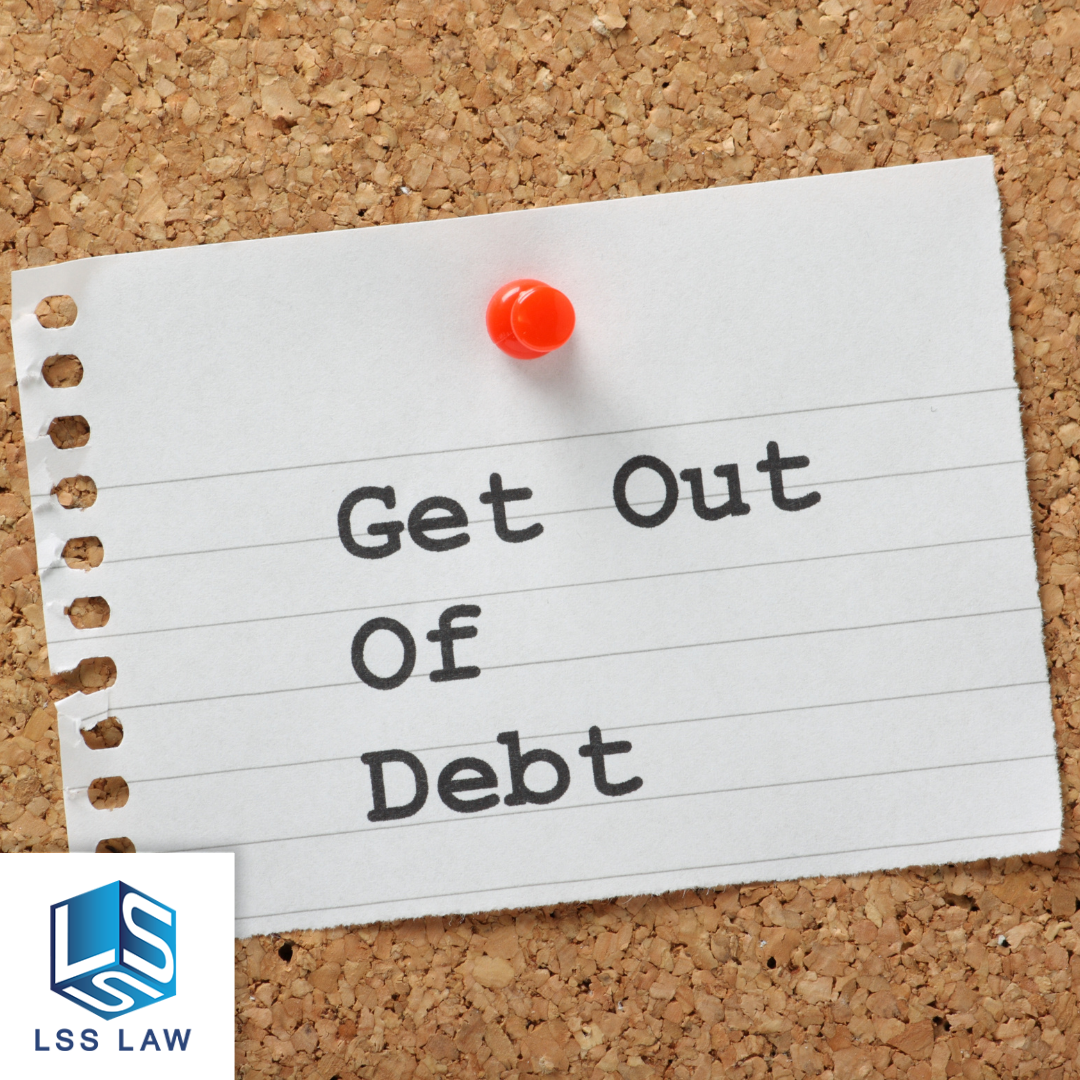
Deciding whether or not to file for bankruptcy is a big decision. While it can be an effective way to clear tax debt, it’s important to consider all of your options and understand the consequences of filing.
At LSS Law, we understand the complexity of bankruptcy and want to help you make the best decision for your specific situation. Below are a few things to consider when deciding if bankruptcy is right for you.
Your Current Financial Situation
Before filing for bankruptcy, it’s important to evaluate your current financial situation. Consider your income, expenses, and debts.
If your debts are overwhelming and you’re struggling to keep up with payments, bankruptcy may be a good option for you.
Your Long-Term Goals
When deciding if bankruptcy is right for you, it’s important to consider your long-term goals. Bankruptcy can impact your credit score and ability to obtain loans in the future. However, it can also provide a fresh start and the opportunity to rebuild your credit over time.
Alternatives to Bankruptcy
Before you file for bankruptcy, it’s important to consider alternative options. This may include negotiating with creditors in order to pay off the debts or seeking credit counseling from a professional.
An experienced bankruptcy attorney can help you understand all of your options and make the best decision for your financial future. Negotiating with creditors can be a great way to alleviate some of the financial stress caused by debt and get back on track to better money management.
Complimentary Bankruptcy Strategy Session with Us

If you’re struggling with tax debt and considering bankruptcy, don’t wait any longer to take the first step toward financial freedom. At LSS Law, we are dedicated to helping you get back on track and achieve a fresh start.
We understand that filing for bankruptcy can be a daunting process. That’s why we offer a no-cost, no-risk bankruptcy Strategy Session with one of our experienced attorneys. During this session, we’ll discuss your specific situation and help you understand your options, including whether bankruptcy is the best solution for you.
To reserve your zero-cost bankruptcy Strategy Session, contact us today via email at info@lss.law or give us a call at 954-466-0541. You can also visit our website and fill out the contact form to schedule a session. Don’t let tax debt hold you back any longer – take the first step toward financial freedom with LSS Law.
Does Bankruptcy Clear Tax Debt? | Your Questions Answered
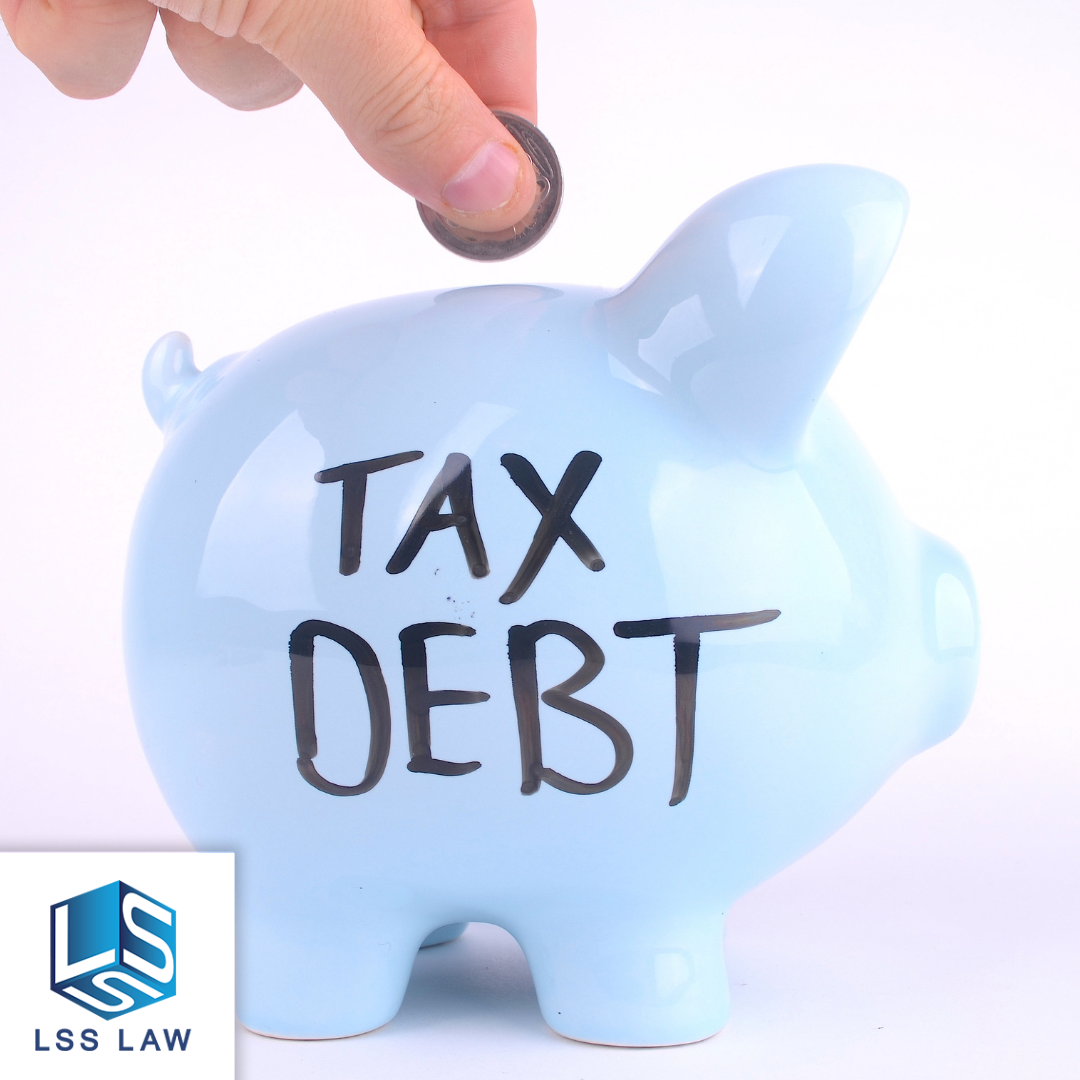
Now let’s take a moment to answer some of your most frequently asked questions about taxes and bankruptcy filing.
Can IRS Tax debt be discharged in Chapter 7 bankruptcy?
Whether or not IRS tax debt can be discharged in Chapter 7 bankruptcy depends on a number of things, including the type of tax and how old the debt is. According to the IRS, tax debts can be discharged under Chapter 7 if they are at least three years old and the taxpayer has filed returns for the previous four tax periods.
An experienced bankruptcy attorney can help you assess whether or not this is a possibility.
Is debt forgiveness the same as debt discharge?
Debt forgiveness is a term that is often used in the context of voluntary agreements between creditors and debtors, such as when a lender forgives a portion of a borrower’s debt as a goodwill gesture or as part of a debt settlement agreement.
Discharge, on the other hand, is a term that is typically used in the context of bankruptcy law, where it refers to the legal process of canceling a debtor’s obligation to repay certain types of debts. Working with an experienced bankruptcy attorney can help you understand your options and determine whether or not discharging your IRS debt through bankruptcy is the right solution for you.
How do I get my tax debt forgiven?
In terms of bankruptcy, there is no forgiveness for tax debt, but it can potentially be discharged. However, whether or not this is possible depends on several criteria, such as the type of tax debt and how old it is. Working with an experienced bankruptcy attorney can help you understand your options.
What debts will bankruptcy not erase?
While bankruptcy can discharge many types of debts, most “priority debts” cannot be erased. These may include payroll taxes, most student loans, some types of tax debt, debts incurred by fraud, alimony, and child support. It’s important to discuss all of your debts with an experienced bankruptcy attorney to determine which debts can and cannot be discharged.
Does Chapter 13 bankruptcy eliminate tax debt?
Like Chapter 7, Chapter 13 bankruptcy may be able to discharge tax debt in some cases. Tax debts can be included in a Chapter 13 bankruptcy repayment plan, which can help people manage their tax debt and make affordable monthly payments. However, whether or not the tax debt can be discharged at the end of the repayment plan depends on the specific circumstances of the case.
Should I file for Chapter 7 or Chapter 13 bankruptcy?
An experienced attorney can help you understand the advantages and disadvantages of each type of bankruptcy, as well as any alternatives that may be available. Most consumers file Chapter 7, however, it is critical to determine the correct Chapter to file and the right one will depend on many things such as your assets and what type of debt you have.
